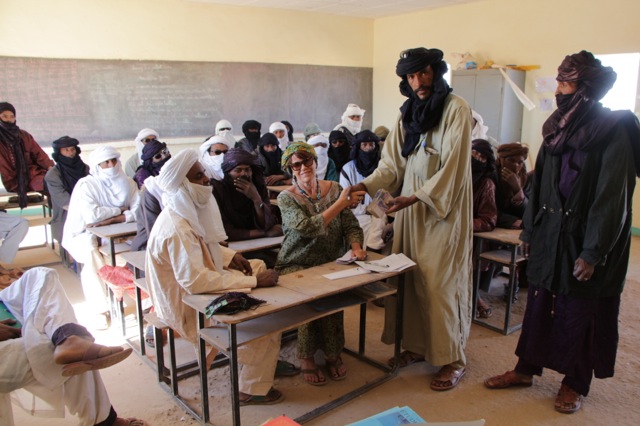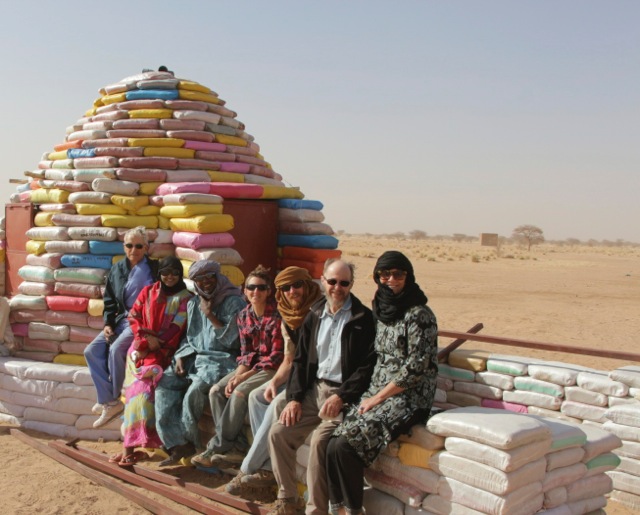RC of Ojai Supports 3 Projects in Niger
Posted by Terry Beckett
 In February 2015, the Nomad Foundation, with funding and staffing from the Rotary Club of Ojai, completed a mission with three components:
In February 2015, the Nomad Foundation, with funding and staffing from the Rotary Club of Ojai, completed a mission with three components:1. Expanded maternal child health education for nomads in Niger
2. Training nomads in earth bag construction while building three structures
3. Economic support for at-risk youth
Read on for details about these three powerful projects and how your club can get involved with the youth of Niger.
1. Expanded maternal child health education for nomads in Niger: This was a project funded with a $15,000 District Grant submitted by Rotary Club of Ojai West with financial support from Rotary Club of Ojai, and staffed by Rotarians from the Rotary Club of Ojai.
.jpg) In Niger, one in seven women have a lifetime risk of death in childbirth. Nomadic women have even less access to health care than women in other parts of Niger. Nomads are widely dispersed in the remote Sahara desert with no doctors, roads or infrastructure. Pregnant women are reluctant to leave their encampments for a distant hospital. This lack of medical attention during delivery, aggravated by poor nutrition and hydration, results in extremely high maternal and infant mortality.
In Niger, one in seven women have a lifetime risk of death in childbirth. Nomadic women have even less access to health care than women in other parts of Niger. Nomads are widely dispersed in the remote Sahara desert with no doctors, roads or infrastructure. Pregnant women are reluctant to leave their encampments for a distant hospital. This lack of medical attention during delivery, aggravated by poor nutrition and hydration, results in extremely high maternal and infant mortality.This mission built on three highly successful Rotary missions started in 2011 in partnership with The Nomad Foundation, during which Rotarian Robert Skankey MD, a retired OB/GYN in Ojai, trained 10 women in prenatal maternal care and childbirth practices. Since “Dr. Bob” trained these "matrones," there have been no mortalities in the 400+ mothers they have attended, and no loss of babies who were born alive. The matrones' training included providing medications to treat infections and postpartum hemorrhage, however they found that better prenatal nutrition, hydration, plus hygiene and sanitary practices prenatally and at birth drastically reduced the need for these imported medications. Dr. Skankey was extremely impressed with the skill and competence of the matrones he trained, and the remarkable statistics resulting from their care.
During this mission Dr. Bob expanded this life-saving training to even more geographically remote areas than were previously served by the original matrones. Health care workers from each of the remote 10 communities were trained by four especially competent matrones, under Dr. Bob's supervision. They were taught proper prenatal care, including nutrition (use of moringa tree leaves and dried onions, both portable for use by nomads), hydration, and hygiene. The training included more effective labor and delivery techniques including complications at birth. Dr. Bob authorized a local staff member to direct the program locally and do follow up missions as she deems necessary. That staff member will evaluate if further training is warranted or necessary and provide local supervision making the program independent of visits from Americans. They were given a solar light to use at night, scrub brushes and soap, sterile blades and ties for umbilical cords, towels, dried moringa and onions, and moringa seeds. A demonstration of planting, care and drying of moringa and onions was made. The presently trained matrones are being paid by their communities providing the funds to replenish their supplies.
2. Training nomads in earth bag construction while building three structures: This was partially funded by Rotary Club of Ojai.
 During this mission, nomads and local construction workers were trained in earth bag construction, a building technique that incorporates a sandbagging system filled with locally sourced earth and clay that is reinforced with barbed wire. Simple to teach and inexpensive to build, the philosophy behind earth bag building is that everyone deserves a sound shelter as a basic human right, and the best and most sustainable way to build is by using construction materials readily available such as the earth of the building site. The resulting construction is extremely solid, waterproof, fireproof, and heavily insulated from the elements costs less than half of any alternative method and uses no wood, a very scarce resource in Niger.
During this mission, nomads and local construction workers were trained in earth bag construction, a building technique that incorporates a sandbagging system filled with locally sourced earth and clay that is reinforced with barbed wire. Simple to teach and inexpensive to build, the philosophy behind earth bag building is that everyone deserves a sound shelter as a basic human right, and the best and most sustainable way to build is by using construction materials readily available such as the earth of the building site. The resulting construction is extremely solid, waterproof, fireproof, and heavily insulated from the elements costs less than half of any alternative method and uses no wood, a very scarce resource in Niger.Two experienced earth bag builders from California traveled to Niger to teach a selection of candidates, some of whom will have some construction experience and others with no experience from the nomadic community. Three structures were built at Tamesna Center: dorms for girls and boys, and a residence for the teacher. This training will provide job skills, and increase access to constructed buildings for the entire nomadic community.
Ojai Rotarian Larry Beckett participated in this project, and also assessed the feasibility of future Rotary well projects.
3. Economic support for at-risk youth in Niger: This is a pilot project, soon to be extended through a District Grant by the Rotary Club of Ojai.
Nomads live in an area bordering between Algeria, Libya, and Mali, three highly unstable countries with porous borders to Niger. Of great concern are the youth who may have no opportunity to continue the traditional activities that have sustained their families for centuries. They are at risk for choosing the criminal activities that are carried on in their terrain: drug trafficking, terrorism, hostage taking. Beyond their traditional livelihood of herding, which is a viable economic venture in the area, their knowledge of the land is the only skill they possess.
During this mission, Nomad Foundation representatives and Rotarians met with representatives of youth organizations from various communities to begin a pilot project where $200 loans will be provided to young men and women ages 16-25 to purchase a small herd or create a small commercial activity. $2,000 will be lent per community; recipients will be chosen by peers through traditional youth groups already functioning in each community, with the Nomad Foundation providing training and accountability. As the loans are repaid, the money will become available for other young people to borrow to start their own businesses too.
Rotary Club of Ojai is applying for a 2015-2016 District Grant to extend this opportunity to young people in other nomadic communities. If you or your Rotary Club want to help fund this project, please contact Kay Bliss (805-640-8331 – kblissojai@gmail.com) or Rob Clark (760-914-0147 – clark@ci.ojai.ca.us).